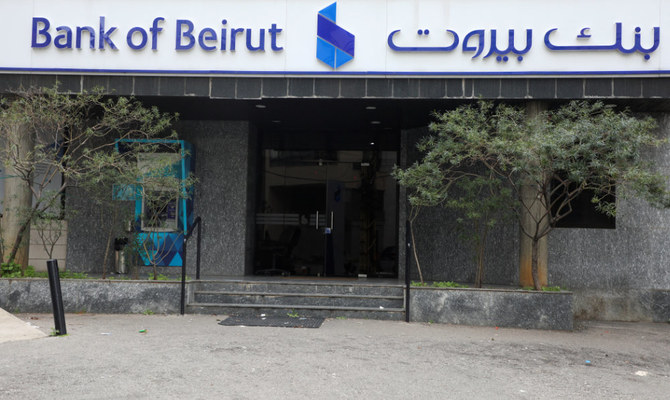
- ARAB NEWS
- 19 Apr 2024

Najia Houssari
BEIRUT: Lebanese banks on Monday declared a two-day strike in protest against judicial decisions issued against Fransabank, Credit Bank, Banque du Liban et d’Outre Mer, Bank of Beirut, Societe Generale, Bankmed, and Aoudi Bank.
The banks condemned the rulings as arbitrary, noting that some lawsuits filed by depositors are related to their requests to recover US dollar funds that have been withheld by the banks for more than two years.
The strike puts the banks on a collision course with the judiciary. The banks and the political elite are now awaiting the outcome of meetings between Minister of Justice Henry Khoury and the heads of the judiciary, as ordered by Prime Minister Najib Mikati based on the principle of separation or powers.
The situation was exacerbated on Monday after Judge Ghada Aoun, the public prosecutor of appeal in Mount Lebanon, ordered the temporary seizure of real estate properties belong to Rajah Salameh — the brother of Riad Salameh, the governor of the Banque du Liban — who was detained on Friday in connection with activities involving the public treasury “which was proven to have been wasted according to the preliminary investigations.”
Judge Aoun said she has now referred Rajah Salameh to prosecutors after having previously referred him to the first investigating Judge in Mount Lebanon, Nicolas Mansour.
Riad Salameh, meanwhile, on Monday failed to show up for a session during which he was scheduled to appear before a judge. As a result, Judge Aoun filed charges against him, businesswoman Anna Kozakova, and a number of companies on charges of “illicit enrichment and money laundering,” and referred the cases Mansour.
In response to the allegations against him, Riad Salameh told Reuters: “I ordered an audit and it was proven that public money was not the source of my wealth.”
Judge Aoun’s preliminary investigations were carried out in response to a lawsuit filed by activist group Rouwwad Al-Adalah, which translates as Pioneers of Justice.
The Union of Bank Employees, which supported the banks in their strike, said it hoped that “the judiciary deals objectively with the crisis with the banks, because the last judiciary decisions did not only affect the concerned banks but bypassed them to touch all the banking sector, noting that its results will be disastrous for the sector abroad.”
The political and legal debate sparked arguments about the legality and illegality of procedures and the economic effects of targeting the banks. There are fears that the banks might escalate their action, which might include an indefinite strike in protest against decisions by the judiciary in favor of depositors.
The Association Des Banques du Liban called on “political authorities to take the necessary steps to stop the legal violations against the banks, and stop the scandalous infringements of some parties, especially the judiciary, in violating the laws and continuing the arbitrary and barbaric practices that would result in a judicial chaos.”
The private banks blame the political authorities and BDL for the deposits crisis, as a result of continuing to take out loans and failing to pay them off, noting that banks continued lending money to the state despite knowing that it would not be paid back because of corruption.
The Federation of Unions of Bank Employees called for the public to be informed “about the reasons which led to the evaporation of the banks’ deposits and to the aggravation of the crisis between depositors and the banks,” and said that “successive governments continued their borrowing policies and kept on spending money without any monitoring until the country fell into the crisis.”
It also queried the role of “the Supreme Judicial Council and the Judicial Inspection Authority in monitoring the work of judges, and the extent to which some judges adhere to the principles of judicial work, especially with regards to the banking sector.”
On Monday, the exchange rate of the US dollar against the Lebanese pound further increased in light of the bank strike, raising fears among the public that prices will increase again. Workers in the public and private sectors and pensioners expressed anger about not being able to withdraw their salaries and pensions from the banks.
Sarkhat Al-Moudiin, which translates as Depositors Outcry, and other activists’ groups threatened “in the upcoming days to expand their efforts to determine criminal and financial responsibilities that led to the current financial crisis, in preparation to hold the politicians responsible, and in order for everyone to get what they deserve.”